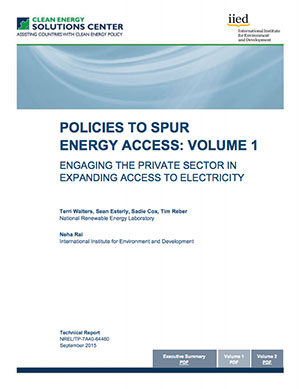Policies to Spur Energy Access, September 2015
Review by Pia Lovengreen Alessi
Author
This report was produced jointly by the Clean Energy Solutions Center (CESC, a multi-government advisory body) through staff at the National Renewable Energy Laboratory (NREL, a US government office) and the International Institute for Environment and Development (IIED, a London-based policy and action research organisation) with additional contributions by many international experts.
Type of publication
This is a one-off report prepared for and sponsored by the United States government in order to support policymakers who want to accelerate distributed off-grid energy access by engaging private sector participants in developing countries or regions.
Topic
It is generally accepted that private-sector investment in distributed off-grid solutions will be fundamental to achieving universal energy access by 2030. Distributed electricity technologies can often provide a quicker, more cost-effective path to electricity access especially for remote or sparsely populated communities with a relatively low energy demand. Small and Medium-sized Enterprises (SMEs) are now able to meet the needs of the poorest and most remote customer through sustainable decentralized electrification that is affordable due to innovative business models. This publication examines what is needed from policymakers and other stakeholders in order to speed up and scale up the process of distributed off-grid solutions.
Main statements
While any new business faces a range of hurdles to start up, those in the energy sector face even greater barriers from traditional monopoly roles for the provision of electricity, additional regulatory burdens on electricity sales, and a lack of workforce or investor experience with the technologies. SMEs are therefore faced with the double challenge of trying to start a business and to create an entire market.
Uncertainties in legal and policy frameworks are often ranked as the main obstacle to private sector participation in the distributed power sector. Governments must therefore design programs to leverage public funds to engage private-sector investment (public-private partnerships), and design transition policies that support private sector investment and market clarity supported by clear and stable legal and regulatory framework.
What is new in the publication
This report identifies four interrelated policy categories that can make a big difference in energy access if pursued in parallel.
1. Establishing an Enabling Policy Environment
Policymakers that want to support a decentralized energy market need to prioritize these energy options into broad national policies for planning and coordination. Policymakers must make sure that a clear strategy for decentralized electrification is outlined in national electrification plans, energy policies and development goals, and make sure that the regulatory framework is updated to meet the needs of both centralized and decentralized electrification. This involves looking at the technological, economic and procedural rules needed to make decentralized electrification bankable. Furthermore, they must make sure that funding initiatives addressed to climate policy, renewable energy, and other development goals, will prioritize decentralized energy systems and include incremental resources for them.
2. Catalyzing Finance
SMEs cannot rely on economies of scale when it comes to providing access to sparsely populated remote areas. Specific instruments must therefore incentivize SMEs to get involved in these “high risk” rural areas.
Stable, transparent and effective policies that meet the needs of the whole market chain are essential to engage the SMEs and to deliver decentralized electrification that functions. This involves not only managing the fiscal policies related to energy access (subsidies, concessionary loans, reduced taxes and import duties) but also regulating the banking sector to facilitate the active involvement of banks and to increase participation by traditional commercial investors and local financial institutions.
3. Building human capacity
To bring decentralized electrical systems to an adequate size requires local capacity in business development, technical assistance, and education of consumers, which is currently rarely available. When the task of building the needed human capacity to support decentralized electrification is tackled adequately, an immense opportunity is created for new enterprises and jobs within the given region, but this is not a simple task and it requires support from policymakers, utilities, financial institutions, and even communities and end users.
4. Integrating energy access with development projects
Energy access in itself is not the end result, but an step to alleviate poverty, improve health and education, support CO2 reductions, and expand agriculture and other productive operations. As such, energy access is key to achieving a variety of development and climate goals, and addressing several of such goals as part of the same project can leverage funding sources and often prove to be attractive to international donors. Policies and financial instruments that integrate broad national goals and put emphasis on complementarity as well as on the formation of partnerships, should be pushed and supported by Governments.
Open issues and comments
While each market will require its own unique solutions, the case studies that accompany this report show that robust policy frameworks— addressing the four categories identified in this report—can lead to rapid progress in energy access. It is important for policymakers to acknowledge that policies for electricity access should include but go beyond traditional regulatory and tariff decisions and this report can help by guiding them in that direction.

